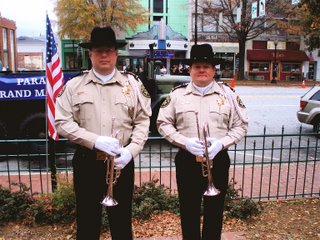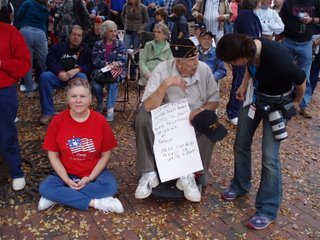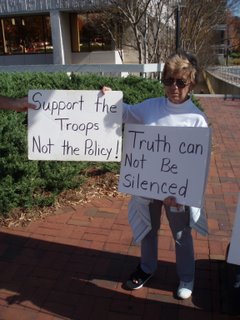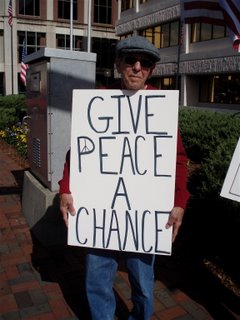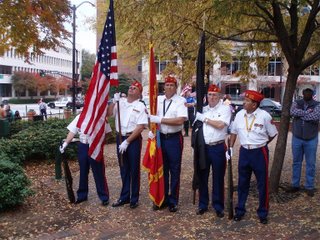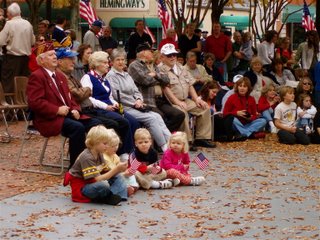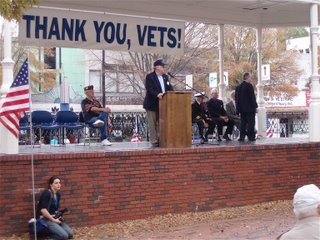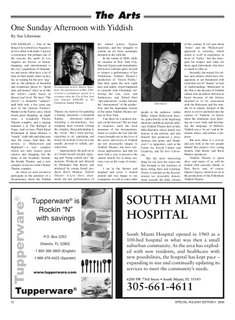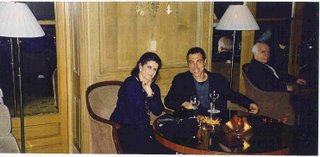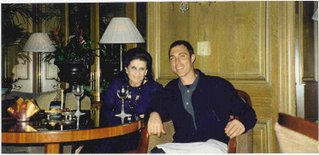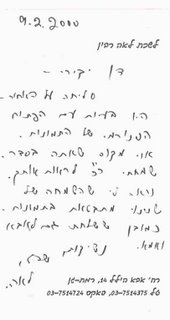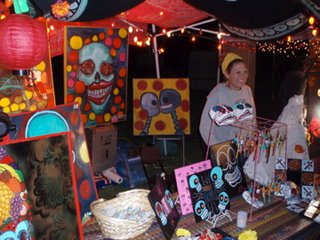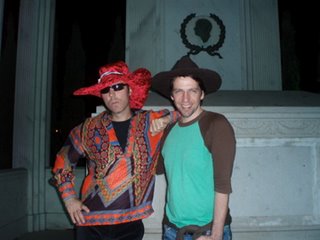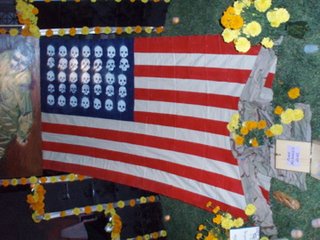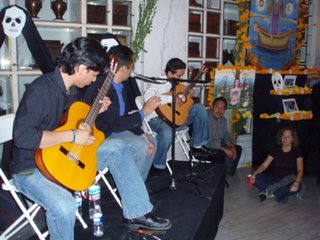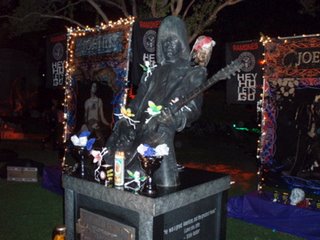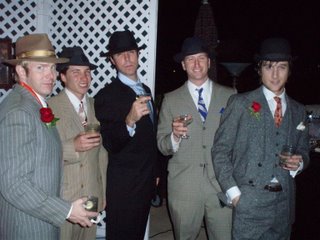Part 2. My new friends commentary blog.
One of the cool things of the modern world, is that if you want to know what a lot of people are really thinking about something, all you have to do is simply log on to their blog, and Kaboom. You get to see inside their heart, brain and soul.
I noticed that my new Jordanian Friend, commentataed about the event we both attended on the website, I already quoted her yesterday. I actually posted this yesterday, but for some reason it didn't stick.
Here goes again. My attempt to help kep for prosterity, the thoughts of my friend about the new film institute.
http://amatalqa.blogspot.com/2006/09/rsica-something-big.html
Friday, September 22, 2006
RSICA: Something Big
I just got back from New York where His Majesty King Abullah announced The Red Sea Intitute of Cinematic Arts. This is a film school for the Middle East, and it will be in Aqaba. It's a 3-year MFA program done in partnership with the USC school of cinema and will be modeled after USC and AFI's approaches to teaching filmmaking. This is a dream becoming a reality. As a child growing up in Jordan, I always wanted to make movies. Now kids can grow up with such goals that can be attainable in Jordan, learning from industry professionals from around the world. The first class will beging in September 2008 as the facility has yet to break ground. You have to start somewhere, and there simply isn't a better place in the Middle East than Jordan.
Oh, and it was really cool to finally meet the big chief.
posted by Amin Matalqa @ 12:36 AM
64 Comments:
At 1:51 AM, Anonymous said...
I read what blogger Laith Majali posted about the film school and it said the school is also open to Israelis. Imagine, sitting next you will be an Israeli who is an IDF reservists and who may have killed or maimed an Arab few kilometers away from the film school. And then we in Jordan will help him make films about evil and terrorist Arabs. This is like Israeli film schools admitting skinheads and neo-nazis. Will we go along with anything if the price is right?
At 6:09 AM, Lubna said...
did you meet any of the big chief's half brothers? i'm curious about ali?? :D
At 10:37 AM, Amin Matalqa said...
I have to tell you, my friend, I have made some wonderful Israeli friends at the AFI, and it's quite narrow-minded of anyone to think that all Israelis want to kill Arabs or depict them as terrorists. There are many peace-loving Israelis who want peace. So please open your mind. We have to start talking to each other and there is no better a place than in film, where artists will show the humanity of their cultures to the world. If all people thought like you do, we would never have peace in the Middle East. My grandfather was Palestinian, and was ousted in 1948. I want dialogue between Arabs and Israelis more than anyone.
At 10:39 AM, Amin Matalqa said...
Hi Lubna,
I met Prince Ali a few times before, most recently in Jordan. He's very charismatic and funny, but as you may know, he's already taken. His wife, Princess Rym is the head of the Royal Film Comission.
At 11:58 AM, Anonymous said...
"it's quite narrow-minded of anyone to think that all Israelis want to kill Arabs or depict them as terrorists."
Except that Israel is a democracy and ever since Israel was founded, the majority of israelis voted for one government after another that continued stealing arab land, killing arabs, and expelling arabs, long before there was hamas or terror. Not to mention that in Israel mnilitary service is for all israelis. So chances are your israeli friends may have killed or shot or abused an innocent Arab. I used to hold you in high regard, I no longer do.
At 12:10 PM, Anonymous said...
Another anon.
So Amin, does the jordanian film school plan to have the israeli students sign a pledge not to ever make films defaming Arabs? How will you know the jordanian film school will be admitting "good" israelis? Background checks?
And as for dialoug with Israelis, I am sure the israelis would love to dialoug with Arabs who never plan to return to Palestine. It makes their job esier.
Amin, I think you will succeed in Amreeka. You say all the right things.
At 6:00 PM, Amin Matalqa said...
Look, I am not a fan of Israel's government. I was in Jordan when they attacked Lebanon. I despise Sharon and his likes. Olmert has joined the ranks. But you will find that many Israelis are not represented by their oppressive government. You have to get this through your head. Just like not all Arabs are terrorists, not all Israelis are Arab-haters. This should be a simple concept people should grasp. Anytime you generalize and reduce a people into a single opinion, you are doing yourself a disservice. Hate has never solved anything. Hate will never solve anything. Your way of thinking will continue to drive the viscious circle of hate. Nothing personal. I don't even know you. But please do open your mind to understanding that people are individuals with indivual opinions and beliefs. And artists and filmmakers will lead the future to understanding the humanity in both sides. Don't be so stupid to think that an Israeli will want to come to Jordan to learn how to make movies so he can go back to Israel and portray Arabs as terrorists.
At 11:55 PM, Anonymous said...
"Anytime you generalize and reduce a people into a single opinion, you are doing yourself a disservice"
What generlization? there is an invasion and innocent people are getting killed daily. and those who are killing them are Israelis and your drinkign beer with them. Do you think they will confess to you and say how many arabs they have killed or abused?
You did not answer the other questions posted. How can you tell a good israeli from a bad israeli? those who drink beer with are good israelis? will that be the test of admitting Israelis to the jordanian film school.
APPLICATION FORM:
Check One:
I DID DRINK BEER WITH AMIN.
NO I DID NOT DRINK BEER WIH AMIN.
At 12:50 AM, Banan said...
We are confusing two issues.
Amin has no control over who attends AFI be it Israelis (with blood on their hand or otherwise), Russians, Germans, ...AFI is an American school and they go by their own rules.
But in Jordan, we have a moral responsiblity and a business interest. Few Arab students will join this school knowing there will be supremacist jews (nice or not) attending the same class. This is bad for business, because most will prefer to go to Egypt or Morocco. Worse yet, another Arab country will open a competing business school with the only advantage of NOT permitting Israeli soldiers to sign up. Where do you think Arab and Muslim student will go? NOT TO JORDAN. Bad business.
But above all, there is something sinister about using the arts to shove Israeli soldiers down our throat when the Israelis themselvs will NEVER permit a Palestinian to attend their universities.
Amin, you are really going out of your way to defend a position that is bad from a business poitn of view and from an ethical point of view.
At 4:25 AM, Amin Matalqa said...
You're rushing to assume that I drink beer. How do you know that I drink beer? What if I don't drink beer?
What I am defending is the concept of humanizing one another. I am also telling you not to generalize.
And finally, I am telling you that this is essential for peace in the Middle East. I'm not going to tell you what to love or hate. It's up to you. It's your loss if you want to keep your ears closed.
At 4:41 AM, Amin Matalqa said...
By the way, this is so typical. Instead of recognizing how amazing this is, having an international film school of the highest standard in Jordan, something amazing for the future, you're nitpicking a little detail and complaining and wining.
At 6:51 AM, Anonymous said...
"What I am defending is the concept of humanizing one another."
Tell that to your Israeli friends. Ask them if they are willing to humanize those they had expelled from their towns and villages. See if they are willing to let them return to their homes? At the conceptual level, what you are saying souds great. But at the practicle level, your Israeli friends will ditch you at the moment you ask them to treat Arabs equally and allow expelled non-jews to return and live with jews. Amin, you can talk peace all you want to me and I will agree with you. But you are dealing with people who don't think non-jews have the same human rights as jews. don't take my word for it. Go as your israeli friends, and jewish friends too, if the are willing to accept the return of non-jews to their homes. Then come and talk to us about peace and dialoug. without substance, these are nothing but coup out words for those who don't give a damn about the misery and suffering of arabs. this way you and the israelis look like peace-lovers and those of us who want peace with substance look like assholes and radicals. Go ask your israeli friends the questions that will show us how committed they are to equality between jews and non-jews.
At 8:46 AM, Amin Matalqa said...
I think we all know there are radicals in Israel, and hostile immigrants, settlers, who have that hatred you're talking about. Those are not the people that will make the world a better place. Do yo actually think that all Israelis don't want to live in peace and harmony with Arabs? It's a basic human value, love your neighbor as you would love yourself. So what I'm saying to you is that in order to arrive at that substance you speak of, we need to communicate. Not through guns, not through yelling (although that's inevitable with Arabs and Jews, it's in our nature), but through communication. Film is one of the most powerful mediums of communication in this day and age. So if we teach our people how to make movies, good movies, and imagine if we also learn that Jews are not too different from Arabs, then we might actually get somewhere. I would rather have that than fueling the viscious circle of fanaticism. That's how we can have substance. If you disagree with me fine. I agree with you that there's an incredible amount of cruelty and injustice forced on the Palestinian people. I despise the Israeli governments for what they've done. But you have to give the people a chance to speak out. This is what film will do.
At 9:07 AM, Anonymous said...
Again, you speak at the conceptual level and you say things that we all agree with. But please ask your Israeli friends if they are willing to treat Arab as equal to Jews and as such allow those non-jews they have expelled to go back to their homes? it's that simple. it's not rocket science and it's not open to philosophizing. The Civil Rights movement and the Anti-Aprtheid movements were not about conceptual but legal. The Israelis would love for us to speak conceptual for the next 200 years. But the key difference between bullshit and honesty is in the substance. Now will you please ask your israeli and jewish friends the Question and tells us what they belive and if their answer is a YES are they willing to go public with it or is it the usual bullshit they say in private and as soon as they lan in Tal Aviv they don their Zionazi helmets and go shooting Arabs. SUBSTANCE PLEASE!
At 9:31 AM, Barak (not) said...
Shalom, I am Barak Gilad and I want to make peace with Arabs. But I will shoot every non-jew who will try to return back to Holy Land. Other than that, I am peace-loving and I love all the Arabs and I love love. And above all, I like cinema and filmmaking. To all the radicals out there, why won't you shake my hand and make peace?
At 10:07 AM, Amin Matalqa said...
Fair enough. I'll ask that question and let you know what they say.
At 10:12 AM, Anonymous said...
Thank you Amin.
At 12:09 AM, Anonymous said...
Not the same A ...a different one.
Anonymous I.....Stop laying a guilt trip on us. You failed to bring peace to us your way. Your fathers and grandfathers failed us before you. Now that we are making headways you lay a guilt trip on us. We are not responsible for what hate is doing to you and your friends. We will not succumb to to the old tried and failed methods. Don't be afraid of a future with peace and a promise of life, liberty, and the pursuit of happiness for all in the region. You are not going to get an inch of land, an iota of redress, a miniscule of a grievance resolved if all you do is complain and lay guilt trips on ones who take one small step forward.
Jordan made peace with Israel. About time you made peace. Start with yourself first and maybe, just maybe you'll see the light at the end of the tunnel.
At 2:37 AM, Anonymous said...
"We will not succumb to to the old tried and failed methods."
Since when is equality tried and failed? It workes in the Civil Rights movement and it worked in ending Aptrheid. If equality is tried in Israel, it will succeed.
"Jordan made peace with Israel."
The government made a treaty. Every survey conducted in Jordan says Jordanians do not agree with this treaty and do not consider israel a peacful country. if there was a referendum or democracy this treaty would have ended the day after it was signed.
At 3:20 AM, Muhannad said...
To Anon2:
And you have no problem if the israeli setting in the class next to you commanded an IDF tank that killed Lebanese women or flew a warplane the bombed Palestinian children?
You must be proud of yourself being someone resistant to guilt. How can parents raise people to gorw up like you? You should write a book about it.
May be we are selfish. True I never got bombed or shot at by Israelis, but I tell you I feel awful when I see those photos of Lebanese and Palestinian civilians torn to shreds. But you are a strong person, a person with neo-character, a Mr. Data, unlike those weaklings like us who still care even when we are not the ones who are directly in pain.
But it's all about money at the end. It has always been about money and who gets it. The carrot si tasty and the donkey needs a carrot.
At 4:02 AM, Anonymous said...
"About time you made peace. Start with yourself first and maybe, just maybe you'll see the light at the end of the tunnel."
I love it when people talk conceptual to avoid the horrific truth. how comde you ask me to make peace when I am not the one who occupies and I am not the one who assasinates and I am not the one who expells? I am the one against all of these things but to you that makes me the radical but the Israelis are the peace-loving people and we saw how peace loving they are in Lebanon.
How come you never point your question to the Israelis who are killing women and children?
Truly grotesque morality, always find ways to be in the good graces of the strong and the rich against those in need of our support and protection.
At 12:18 PM, Anonymous said...
Wow same old drama we hear whenever something good for our country comes up! wake up ya'll and start with co-exsistance...or shall we make it into a movie starting Gear and Aniston so that you all race to the cinema to watch and enjoy?
When would you all wake up and think as individuals that make a diffence , after all it's usually an individual at the end who bombs himself after being brainwashed by so-called united groups' crap, where were they to protect our innocent?
Still those individuals taged the rest of us arabs as terrorists? same way you are generalizing all individuals as being and having to be with one view of thinking...
When many of you are filling the seats of theaters everywhere in Amman assuming i generalize , People like Amin aspire and inspire many of us to follow our dreams and make that screan you watch rather than to re-live one non-stoping terror nightmare over &over again!
By the way...Ramadan kareem, arn't these bitter feelings supposed to pause durring the Holy month?
Congrats to all those who see beyond the horizons on the good news about our Jordanian film school, may it be a gate for a better future to all those who believe in this art...
This site is for a film makers journey...if you have something to say about that then you are in the right place ...othrewise...there are many other blogs where you can express your negative thoghts..try www.negativethinking.com.edu
Amin,
Cant wait to see the Captain Abu Raed site soon...Best of luck always
At 12:36 PM, Anonymous said...
so let me get this straight: those who want to stand up to murderers and supremacists and want to stand for the victims are negative and anti-peace.
Those who only think of themselvs and want to play sidekick to the rich and strong are pro-peace and positive poeple.
How interesting.
At 8:05 PM, Anonymous said...
hey!
i met amin in the AFI.
my name is oded. a jewish religous israely.
i want to say that it is easier to hate than to love. it is harder to build than to destroy.
anyone who is afraid to talk or avoids it is beneath those who do try.
i beleive that meeting people and tallking to them will only help treach an understading.
by the way- if amin wants to move to israel- hw could stay in our apartment till he finds his own place.as i invoited him this last summer to do.
i am not worried by the narrowminded who object positive thinking and actions.
they are simply a waste of time.
oded
At 8:50 PM, Amin Matalqa said...
Thanks everyone for being involved in this debate. Thanks everyone for talking, venting, and voicing. I hope a message can be reached here, that though dialogue we can come to understand. Through love, we can come to understand that we're all the same in the end. I'm not being idealistic. I'm being hopeful that maybe we can stop blaming and hating and start looking forward. Being progressive.
Much love to both side of the argument.
Amin
At 10:08 PM, Anonymous said...
To all of the anonymouses
The Goal is Justice (not just us),
Address of Grievance (not just grieving), Unity of purpose(not just perpetual disagreement), Peace with the enemy (not just piss on the enemy.
You don't make peace with your friends. You make peace with your enemy.
At 12:39 AM, PeaceLoving said...
"You make peace with your enemy."
Words of wisdome. TO ALL ZIONISTS OUT THERE I WANT TO MAKE PEACE WIHT YOU. I HAVE MY BAGGS PACKED READY AND I WANT TO LIVE IN HARMONEY WITH YOU IN SAFAD WHERE MY PARENTS WERE EXPELLED. WILL YOU LET ME RETURN?
At 12:53 AM, kinzi said...
Amin, I'm excited for the film school and what it will mean for the kids in school now who will become Jordan's reps in the industry in the future.
Nothing good comes easy, God bless you as you fight the good fight to make it happen.
At 2:00 AM, Shlomo said...
To Peaceloving Arab:
Peace to you too cousine. We can all get along if we make an effort. The good news is that for you, the effort is minimal. Just stay put and unpack your bags. I love you, God loves you. Lets hold hands. We must learn to love one another.
At 8:40 AM, Anonymous said...
Every thing is possible when there is peace. So make peace. Lets make peace. We'll work out our differences. You can come and live among us. We will love you just as much. There is already 2 million like you living among us. They weren't expelled. We know how to do it. If you don't know how to do it we'll take time out to teach you about democracy, minority rights, rule of the majority, limits on power, liberty, rule of law and order, free market, free speach, representative rule, religious freedom, personal responsibility. I hope all of your countries will be open for us to live in them too in peace among you. You know some of us were expelled from the Arab world as well. Do you think you are up to it?
At 1:46 PM, Anonymous said...
To Israeli: "You can come and live among us. We will love you just as much."
Great. Can you please post the Israeli law that permits expelled non-jews to return to Safad? Either I did not read anything about this new law or you are just another lying israeli who talks peace while pulling on the trigger.
At 6:37 PM, Anonymous said...
You can't put the horse before the cart dear friend. Peace comes first. Democracy has an inherent law and it is just as valid as the right to breath. Its called freedom of movement. That we can negotiate while we are making peace. I envision a peace treaty that will allow some the right of return to their homes among us. As I expect some of us will be allowed the right of return to their home among you. Lets face it no one is an island.
At 7:01 PM, Anonymous said...
Sorry "the cart before the horse".
Please go to www.metalks.com there you'll find lots of peace loving people from both sides. You may find it interesting and open for discussions on all issues.
At 9:30 AM, Remote Control said...
The Israeli gift that keeps on giving. When you cut throught the bull, this is what Israel is all about...
BBC: 'Million bomblets' in S Lebanon
Last Updated: Tuesday, 26 September 2006, 16:09 GMT 17:09 UK
Explosives expert prepares to detonate cluster bombs in Majdal Sellem, south Lebanon
There are three times more live devices than previously thought
Up to a million cluster bomblets discharged by Israel in its conflict with Hezbollah remain unexploded in southern Lebanon, the UN has said.
The UN's mine disposal agency says about 40% of the cluster bombs fired or dropped by Israel failed to detonate - three times the UN's previous estimate.
It says the problem could delay the return home of about 200,000 displaced people by up to two years.
The devices have killed 14 people in south Lebanon since the August truce.
...
http://news.bbc.co.uk/2/hi/middle_east/5382192.stm
At 6:21 PM, Anonymous said...
More Israeli love. Peace to all. Love one anothers. Why can't we just get along.
---------------
Medics: IAF air strikes in Gaza kill girl, 14, wound seven
By Gideon Alon, Haaretz Correspondent and the Associated Press
Israel Air Force air strikes on a house in the southern Gaza Strip town of Rafah early Wednesday killed a 14-year-old girl and wounded seven other people, hospital officials said.
http://www.haaretz.com/hasen/spages/767406.html
At 3:22 PM, Lubna said...
Yes, she is the head of the Royal film commission, and I do like her:) I know he's taken; he's just my favourite member of the royal family.
Besides this, I am with this School; it’s a humongous, amazing, good step forward for Jordan! It makes me proud.
At 8:11 PM, Anonymous said...
Check this out for FREE...
This opportunity says:
"Your Ad" Will Be Instantly Displayed on Thousands of Websites and Read By Over 10 Million People Per Week For FREE, and It Only Takes 60 Seconds To Get Started!
To find out more visit: money making site. It successfully exposes FREE information covering Traffic and money making related stuff.
At 9:32 AM, karima said...
"Avnery: Violence is part of the resistance to occupation. The basic fact is not the violence; the basic fact is the occupation. Violence is a symptom; the occupation is the disease - a mortal disease for everybody concerned, [both] the occupied and for the occupiers. Therefore, the first responsibility is to put an end to the occupation. And in order to put an end to the occupation, you must make peace between the Israeli and Palestinian people. This is the real aim, this is the real task."
This is a quote from Uri Avnery, an Israeli journalist living in Israel. I recommend you read more of what he writes. Here is one Israeli who does not share the politics of his country. As I certainly don't. But this does not mean that I make all Jews my enemies. I have many Jewish friends and have grown up in a country, Tunisia, where the Jewish community has existed for over 2,000 years. I now live in Morocco where the Jewish community, although shrunk over the years, is still an important part of Morocco. As a matter of fact, today, Yom Kippur, I, as a Muslim, am invited to break the fast with my Jewish friends. This... is what I call friendship, dialogue, communication, tolerance...
And to end off - another quote:
"Peace is not a relationship of nations. It is a condition of mind brought about by a serenity of soul. Peace is not merely the absence of war. It is also a state of mind. Lasting peace can come only to peaceful people."
Jawaharlal Nehru (1889 - 1964)
Amin - keep up the good work!
At 11:48 PM, Raz said...
As a Jew and an Israeli may I say that this is the first time I have seen an arab blog. As I read some of the comments I am amazed at most of your distorted perceptions of History, I thought at least Jordanians whom I have meet a few would have a greater grasp on reality. Why is it non of you are aware of the arab massacers against Jews as far back as the 20's
(hebron) these are not made up massacers like the ones that muslims make up(deir yassin,Jenin,and i can go on)
how about all the REAL terrorist actions by muslims against Jews b4 '67. How about Jordans destruction of Jewish artifacts from 48-67 while Jordan illegally annexed Judea and Sameria. How about the fact that the muslims where "southern Syrians" and Egyptions until 1964 then decided they where "Palastinians". How about the 5 wars (which you lost) muslims started against the Jewish people in order to wipe them off the map...not to reach an agrement but to kill us..okay enough history how about today, 1.5 million muslims live in Israel,are members of the Kennest, and suprem court. muslims go to our schools every day and my doctor is a muslim and get this a women as well!! As far as returning to your"homes" well it was in 98% of the cases your own leaders who told you to leave your homes and wait till the Jews where pushed into the sea, and do you mean that the 850,000 Jews who where forced to leave arab lands from 48-54 should be allowed to return to there homes? and is this not just another attempt by the muslims to rid the area of the 1 and only Jewish nation by war of the womb? As far as the killing of today goes your "fighters" hide behind women and children hoping they will be killed for propaganda and we in Israel mourn those innocent deaths, while you celebrate the death of ours!. Stop making the same mistakes of your fathers and grandfathers , accept the Jewish nation allow the return of your brothers and sisters to there muslim homes as Jews accepted arab Jews to there Jewish homes, hold your leaders accountable for your plight and culture of death you embrace, and for heavens sake please stop reading your own propoganda and maybe there will be peace!! And I love how you laud over those Jewish writers who are on the fringe left of Israeli society.
At 12:05 AM, Raz p.s said...
If the muslims would lay down there weapons we could have peace...If we Jews would lay down our weapons we would be dead!!
At 5:21 AM, Anonymous said...
these negative coments are quite surprising, but also predictable. i live in israel with my israeli arab wife, who grew up here. she loves israel because of all of the freedom and privileges she has. she grew up in an arab town and, according to her, experienced 99% of the prejudice she's felt from her fellow muslims. sure, jews treated her bad because she is an arab, but nothing like her fellow arabs. she has travelled to the west bank, gaza, and other middle eastern countries and realizes how blessed she is to live where she does, and not under such arab oppression.
i am a also christian and we live in a jewish city becuase of my job. we tell everyone we meet who and what we are and have never had a problem. our religious jewish neighbors have been nothing but nice to us and they adore my wife.
say what you want about the zionists, but i know one thing: i could not be as free and open about who i am in any other place in the middle east. israel, with all her faults, is not the way you describe it. it is amazing to see such ignorance.
mike, who loves arabs and jews
At 7:12 AM, JOKE said...
great. after the jerusalem post article we will have all these israelis posting with arab names telling how great israel is to arabs and how nasty arabs are to other arabs.
At 10:30 AM, Anonymous said...
I am an Israeli reservist who is also a student film-maker. If I were to go the film school, I strongly expect that I will be sitting next to an Arab related to someone who has either blown up or stabbed to death many of my relatives or friends. All the pain they have caused me will not stop me because I know that the future is in peaceful co-existence. The previous post is for narrow minded fools who live in the past and know only death and fear. Peace is for the brave.
At 11:10 AM, Dan said...
Right on Amin! Make movies... not war.
Since when are Israelis the only one that are bloodthirsty demons?? Israel's government accepted one terrorist with lots of blood on his hands, yassir arafat, as a negotiating partner and in the end it was he would could not abandon the pornographic violence of terror and the corruption of politics. If Palestinians were to put someone up as a leader who was serious about real negotiations (rather than presentating maximalist demands in a media savvy way), then Israeli public opinion would sway quickly into a positive direction.
This school is a great idea, and Arabs and Jews attend school quite well together in Universities all over Israel. Why not an Arab country as well?
At 2:46 PM, Anonymous said...
"rather than presentating maximalist demands"
funny, a russian jews right to return to a country he never stepped foot is is a god given right.
A non-jew's right to return to a land he was expelled from in 1948 is maximalist demand. All along i thought that was a basic human right.
Israel is a supremacist freak show.
At 3:06 PM, Anonymous said...
"Arabs and Jews attend school quite well together in Universities all over Israel. "
Really? you mean Israeli Arabs and Israeli Jews.
So what? Jordanian of all religions and races to go to the same schools in Jordan.
but how many palestinians are permitted to go to israeli universities openly and freely? NONE. So don't expect us to roll the welcome mat for you.
BTW, how many Arab children have you buried in Lebanon? Or is your specialty Arabs in Gaza? Or may by you are a pacifist who just likes to man checkponts and watch pregnant arab women abort their babies and old men with kidney problems perish.
You go fix your problems with the palestinains then you can come and talk to us about co-existance.
I find it rather disturbing that you think you can just drop by for coffee as if things are normal and as if we don't watch the news of your murders. just a couple of days ago you bombed two teenager to shreds. They were biking together. before that you killed a 14 years old girl. And almost everyday you send your snipers and missles to snuf the life out of so many non-jews. So you are either an emotioanlly troubled person who sees nothing wrong with killing Arabs then trying to be friends wiht them. Even the White South Africans had enough decency to know none of their black neighbours really liked them very much. But here you are a clinically self-absorbed human being who is totally incapable of seeing the ugliness of your actions and how they affect how others preceive you. I think the west has sheltered you for so long to the point you are incapable of telling right from wrong and decent from indecent.
At 10:47 PM, Anonymous said...
mr anonymous needs to get over his anger. life is not fair. we don't always get what we want, deserve. we can either brood about it and feel sorry for ourselves, plot revenge OR we can stop the madness.
but, hey, everybody is doin' it so let's keep the fire burning!
At 1:07 AM, Anonymous said...
signed (above) mike
At 3:00 AM, Anonymous said...
MR HOTAIR SAID: "we can either brood about it and feel sorry for ourselves, plot revenge OR we can stop the madness."
More fluffspeak that has no substance.
There are two madnesses and feel free to stop them anytime you wish: occupation & ethnic cleansing.
When you succeed, come and tell us the good news and we will buy you coffee. Other than that, you are full of worthless hotair.
At 6:46 AM, Anonymous said...
the only ethnic cleansing that hapened is removing jews from gaza (judenfrei). you know, ending the occupation there.
hyperbole in word or thought is simplistic and uneducated. jews don't hate arabs. take it from someone who lives here in the middle of them.
hate will destroy your soul, especially when the zionists have done nothing to you.
mike
At 8:07 PM, Anonymous said...
What a fascinating blog this is. It's a real revelation to start at the top of this thread and listen the the Israel bashing. As soon as someone who points out the opposing view on reality, all the locals go ballistic.
I totally agree with everything that Raz said. To conveniently leave out the reality of history is wrong. Hundreds of thousands of Jews were expelled from Iran, Iraq, Yemen, and on and on. Property confiscated. The Palestinian Arabs were told to leave and, as always is the case in war, populations shifted. The only difference here is that the Arab countries have kept, with the cooperation of the UN, thousands in refugee camps. Why? Why haven't these people's talents as farmers, herders, and on and on, been taken advantage of by the parent Arab countries... this is a historical first. Jews have ALWAYS had a presence in the M.E. Take the ball bearings out of the suicide belts, and make movies.
At 5:34 AM, Anonymous said...
"Hundreds of thousands of Jews were expelled from Iran, Iraq, Yemen, and on and on."
I am appauled at your talent for deception and distortion.
I lived the cold war years and I remember the pressure the US and the West applied on countries like USSR, Ethiopia, Yemen, and others to let the Jews leave to Israel. the US used blackmail, money, coercion to force those government to support airlifts of jews to Israel.
Yet here you are lying with a straight face about these airlifts as if they were some ethnic cleansing campaign against Jews.
I hate your lies.
Of course there were attacks against Jews, but hardly at the scale Arabs suffered at the hands of Jews in Israel and US. but the departure of jews from Arab and non-Arab countries was a compaign paid for and financed by Israel and its friends to beef-up its jewish majority. Even today, this ongoing.
STOP THE LIES FOR A CHANGE, PLEASE.
At 11:24 PM, Anonymous said...
anonymous,
you say:
"US and the West applied on countries like USSR, Ethiopia, Yemen, and others to let the Jews leave to Israel."
my nextdoor neighbors are iranian jews, had to leave iran in the dark of night. yesterday i was with an iraqi jew friend, had to leave iraq the same after proprety confiscated.
you can debate the scale and who was hurt the most (which is debatable). arabs are treated well in israel, better than arabs treat palestinians and arab christians. and arabs are treated bad ing the US?? whatever. by the way, do you help make palestinian refugees lives better, or just use them for your rhetorical purposes?
you can use partial facts, facts without context, mold them to your advantage or whatever, but when will you ever get over it and try to work towards peace? israel got out of gaza, lebanon, sinai, is on record for offering the golan back to syria (many times), and was planning to get out of the west bank until the war. WHAT MORE DO YOU WANT??? arabs have it pretty good in israel (since, for example, jerusalem arabs completely object to being citizens of palestine if given the choice).
i think you are not interested in the whole truth, are prejudiced, and love to hate. but, hey, that's cool because everybody else is doin it. and why palestinians, if you really care about them, will continue to suffer.
mike
At 3:25 AM, Anonymous said...
"my nextdoor neighbors are iranian jews, had to leave iran in the dark of night."
If you want to lie, make it beliveable. There is still an Iranian jewish community living in Iran. Same in Iraq. Why?
I could care less what your israeli iranian neghbour says. Israel is based on many lies and Israelis are partners in these lies. I have no reason to belive your post because facts on the ground say you are lying. The paid-for airlifts, the jewish communities in Muslim countries, etc. You can't hide those with personal stories that only you can confirm.
Lets take this jewish explusion and exile story further. Here you have Israel, a nuclear state. its a regional super power and has a strong economy and a powerful military. How come there are more jews outside of Israel than in Israel? In your history books, you made up stories about jews being forcebly scattered becuse someome expelled them from Israel. Well here is Israel...TA DA! still, most jews live outside of Israel. Forced expulsions?
But you know how we know zionism is built on lies. The first lies is that "Israel is a land without poeple for people without land"
With few exceptions, I have never met an Israeli that did not lie. Lying is part of the Zionist culture. It's necessry to provide cover for its racist ideology.
At 7:13 AM, Anonymous said...
above,
why should i explain anything to someone who has their mind made up? my neighbors feared for their safety, real or perceived. they had to leave without anyone knowing, lest they be prevented and be in trouble, real or imagined. is it unimaginable for muslims to react to jews wanting to go to israel? look at your own irrationalality and i can understand.
you are a prime example why i do not live among muslims - everything is a conspiracy and everyone is a lair. you are truly pathetic. even if jews were the monsters you claim them to be, i'd take them any day over your worthless lot. thankfully i have that choice.
get a life, preferably in the real world.
mike
At 4:17 AM, Anonymous said...
SHALOM ARABS!!! I am Shlomo again. Remember me. i love the idea of film school where I can go and relax after I kill arab family of five. but i am sure you will understand since peace means you have to compromise, dialoug, and reach out. I want to reach out...oh...never mind the blood on my hand. love conquers all....Peace brothers...Sorry but I have to leave now. I see an arab kid in my crosshair. have to clean some land....Shalom...shlomo
----------------------------------------
http://www.haaretz.com/hasen/spages/773817.html
IDF troops kill five family members in Gaza clashes
By Amos Harel, Mijal Grinberg and Yoav Stern, Haaretz Correspondents and Reuters
Israel Defense Forces troops killed six Palestinians, among them five relatives, during raids in the southern Gaza Strip Thursday, witnesses and medics said.
They said troops backed by helicopter gunships entered the village of Abassan, east of Khan Yunis, at dark, touching off clashes. Of the five relatives, three were armed militants of the ruling Hamas party's militant wing. They were identified as Abed Rahman Kadiah, 25, Salah Kadiah, 25, and Naeel Kadiah, 22. The other two family members were bystanders, named as Adal Kadiah, 40, and his 13-year-old daughter Suhaib Kadiah.
The fourth militant was killed later Thursday as clashes raged into the afternoon. IDF troops opened fire on the man as he advanced toward them under cover of a large crowd.
Advertisement
The IDF confirmed its forces were operating in the area looking for facilities used by militants. Troops fired on gunmen who tried to attack them, an army spokesman said. At least 11 Palestinians were wounded in the clashes.
"This is an area believed to conceal tunnels and other forms of infrastructure used by terrorist groups," he said.
Militants fired anti-tanks missiles at troops raiding the area, but there were no casualties among the soldiers.
Earlier Thursday, the Israel Air Force destroyed the house of a Hamas militant in the Jabalya refugee camp, which the IDF said was being used as a storehouse for weapons.
Also Thursday, two Qassam rockets fired by Palestinians in the Gaza Strip landed in open fields in the western Negev. There were no injuries in either incident, but some farmland was destroyed in one of the blasts.
In overnight raids in the West Bank early Thursday, IDF troops arrested 12 wanted militants. Troops came under explosives and gunfire while operating in Nablus and Tul Karm. There were no soldier casualties in either incident. A Palestinian was wounded during the Nablus operation, but his condition has not yet been confirmed.
In a separe incident Wednesday, IDF troops killed a would-be suicide bomber attempting to infiltrate the security fence south of the Karni crossing and a wanted militants in Nablus.
Troops operating in Nablus Wednesday also killed a wanted Palestinian militant from the Al-Aqsa Martyrs' Brigade, Abdullah Mansour, who they said attempted to detonate explosive near their position. Mansour's relatives said he was killed by a single bullet to the head as he looked outside his window at gunbattles taking place outside between militants and IDF troops.
The IDF's offensive in Gaza, ongoing for almost four-months, was launched after IDF soldier Gilad Shalit was abducted and two of his comrades killed in a cross-border raid on June 25. Israel has since mounted several major military operations in Gaza aimed at retrieving Shalit and stemming cross-border rocket fire by militants. Around 230 Palestinians, half of them civilians, have been killed.
The governing Palestinian faction Hamas, some of whose gunmen took part in Shalit's abduction, says the soldier should be traded for Palestinians held in Israeli jails.
Israel has publicly refused a prisoner swap although political sources expect it to relent as part of an Egyptian-brokered deal.
At 1:25 PM, Anonymous said...
above: did you read your article??
"three were armed militants" (ie, terrorists)
oh, and this is good:
"fourth militant was killed later Thursday as clashes raged into the afternoon. IDF troops opened fire on the man as he advanced toward them under cover of a large crowd"
it's revealing how your "militants" use palestinian civlians as human shields or israeli civilians as targets. nice.
by the way, thanks for proving my point for me.
"If Palestinians lay down their weapons, there will be peace. If Israel lays down their weapons, they will be dead."
peace, mike
At 2:46 PM, Anonymous said...
so this is how you get away with murdering people. you just say they are militants, no court, no justice, no proof. Just a sniper bullet or a missle. Just cold blooded murder, and all you have to offer us is an accusation that no one can verify. The Nazis said many terrible things about jews that they did not feel they had to prove. Are you asking us to accept your low-standards and theirs as suffcient to kill innocent people? Why deny this same standards to other terrorists groups, now that we seem to have a new acceptable standard for murder? So next time someone shoots an israeli all they have ot say is "jewish militant" and that should make it morally and legally acceptable and world opnion should understand. right? but of course if murdered Arabs are not militants, they are collateral damage, like the poor girls you have butchered today. Net result is you kill anytime and it's ligitmiate because arabs are either militants (and that I guess means you can kill them) or collateral damage (like the hundreds of lebenese women and children).
So you are just a killing machine directed at Arabs. wow. and you want to sign up for an arab film school and we are suppose to welcome you. Shit man, what will guarantee that you won't kill your arab classmates if you suspected they were militants? you have immunity when it comes to killing arabs.
You know what, no wonder very few arabs feel any sympathie for your losses. You are just cold blooded butchers with no remorese and no humanity.
-------------------------------
IAF missile strike on Hamas man's Gaza home kills 8-year-old girl
By Amos Harel, Mijal Grinberg and Yoav Stern, Haaretz Correspondents and Reuters
Oct 13, 2006
At least two Palestinians were killed and seven injured, one seriously, in an Israel Air Force missile strike on the Gaza City home of a Hamas leader Thursday night.
An IDF spokesman confirmed the air strike targeted the house of a Hamas commander, Sharaf Farwana, in the Sajaiyeh section of Gaza City near the border with Israel.
Farwana survived the attack, but the strike killed his brother, 25-year-old Aiman Farwana, and a 8-year-old girl.
The latest strike came after six Palestinians were killed in a clash between the Israel Defense Forces and militants in southern Gaza earlier in the day.
Shortly after the IAF strike, Palestinian gunners fired a Qassam rocket at Sderot. The rocket slammed into a electrical powerline and plunged the city into darkness. There were no reported casualties.
Also Thursday, a Hamas militant identified as Majid Darbiya was gunned down in Beit Lahia by unknown assailants.
Hamas vows revenge
A spokesman for the Hamas military wing earlier on Thursday vowed the group would take harsh revenge for the IDF operation in Gaza, in which six people - including four militants - were killed.
Five of the dead were members of the same family.
"In light of the ugly crimes in Khan Yunis and the northern Gaza Strip, we will bombard and strike in every place, north and south. The response will be powerful and will cause the earth to tremble. The enemy must now wait patiently for our actions," he said.
Witnesses and medics that said troops backed by helicopter gunships entered the village of Abassan, east of Khan Yunis, at dark, touching off clashes.
Of the five family members killed, three were armed militants of the ruling party's militant wing. They were identified as Abed Rahman Kadiah, 25, Salah Kadiah, 25, and Naeel Kadiah, 22. The other two family members were bystanders, named as Adal Kadiah, 40, and his 13-year-old son Suhaib Kadiah.
The fourth militant, Mohammed Barakha, 23, was killed later Thursday as clashes raged into the afternoon. IDF troops opened fire on Barakha as he advanced toward them under cover of a large crowd.
The IDF confirmed its forces were operating in the area looking for facilities used by militants. Troops fired on gunmen who tried to attack them, an army spokesman said. At least 11 Palestinians were wounded in the clashes.
"This is an area believed to conceal tunnels and other forms of infrastructure used by terrorist groups," he said.
Militants fired anti-tanks missiles at troops raiding the area, but there were no casualties among the soldiers.
Earlier Thursday, the Israel Air Force destroyed the house of a Hamas militant in the Jabalya refugee camp, which the IDF said was being used as a storehouse for weapons.
Also Thursday, two Qassam rockets fired by Palestinians in the Gaza Strip landed in open fields in the western Negev. There were no injuries in either incident, but some farmland was destroyed in one of the blasts.
In overnight raids in the West Bank early Thursday, IDF troops arrested 12 wanted militants. Troops came under explosives and gunfire while operating in Nablus and Tul Karm. There were no soldier casualties in either incident. A Palestinian was wounded during the Nablus operation, but his condition has not yet been confirmed.
At 12:21 AM, Anonymous said...
you're right, when a jew kills an arab it is unforgivable.
-when palestinians kill each other in gaza, or
-shi'ites kill sunnis in iraq by the hundreds, or
-sunnis kill shi'ites by the hundreds, or
-the sudan genocide, or
-"honor" killings on a daily basis in the muslim world, or
-weekly beheadings in thailand, and
-and all other jihad murder around the world....
*yawn*
no, the jews are much worse (that probably explains why you dance in the streets, bellies full of batlawa, when jews are killed. gotta maintain that "honor", no?
bottom line: muslims have BIG problems, and it's not jews. you can't blame everything you do away on others.
a little personal responsibility would go a long way, but your disasterous pride and ego won't let you.
you got problems? look in the mirror. only you can fix them.
you can have the last word. i'm outta here.
peace (you should try it), mike
At 3:07 AM, Anonymous said...
Mike, what is you IQ? how did you get from Palestine to Iraq? Do you ADD? Or u just plain slow? or is this the ususal if i am out of excuses, run to another topic? must be an IQ issue.
At 5:38 AM, Anonymous said...
Hello Arabs and Yellow Race people. We want to make peace with you low lives. Israel is a liberal western white democracy, not yellow. Please remember that....Peace...Israeli ambassador to Australia
---------------------
Foreign Ministry slams envoy's comments about 'yellow race'
Oct 13, 2006
By Charlotte Halle, Haaretz Correspondent
The Foreign Ministry on Friday condemned remarks by the Israeli ambassador to Australia in which he told Haaretz that the two countries are white sisters amid "the yellow race" of Asia.
"If the article is accurate, this is a grave and unacceptable remark," the Foreign Ministry said in a statement. The ministry said it will not return to business as usual if an internal examination confirms that the ambassador, Naftali Tamir, in fact made the comments attributed to him.
Tamir said that due to what he characterized as the racial similarities between Israel and Australia, the two countries should work together to enhance ties with other Asian countries.
"Israel and Australia are like sisters in Asia," Tamir said in an interview with Haaretz during a visit to Israel this week. "We are in Asia without the characteristics of Asians. We don't have yellow skin and slanted eyes. Asia is basically the yellow race. Australia and Israel are not - we are basically the white race. We are on the western side of Asia and they are on the southeastern side."
http://www.haaretz.com/hasen/spages/774471.html
At 3:23 PM, Anonymous said...
Guess all Israelis act in the same way ... even they tell you, how they love to live in peace with thier arab neighbours , but at the end they will stand against YOU!
no matter where your from jordan, ...., but this will all end for thier own good not for our good, so think about it again and make your own thoughts .
Yours
Agl
At 5:23 PM, Anonymous said...
"Guess all Israelis act in the same way ... even they tell you, how they love to live in peace with thier arab neighbours"
I guess when you are a democracy that elects its leaders, that means the killings and the brutality and the ethnis cleansings are the choice of the majority in Israel. Unlike the so called peace in jordan, which is the choice of leas than 1% of the population. Jordanians don't like to watch fellow human beings murdered by poeple they are forced to shake hands with.
Is that all you have to offer for all the killings you have committed? Your silly post?
Words are cheap and meangless when contrasted with your daily killing sprees. Actually, they reflect a deeply disturbed mentality when the killer extends a hand of peace then goes the next day to kill some more.
At 2:58 AM, Anonymous said...
democracy in Israel ? this is strange thing to say ... you have to learn the real meaning of democracy before having one thought that Israel is a democratic place... what happend to all Minorities living in Israel ? Muslims, Christians, others..., one example of your called democracy in Israel in why Muslims and Christians beeing banned to practice or pray in thier holy places, when the Jews allowed to have totaly free access to enter thier own worship places!
the ONE rule in Israel says " If your not Jewish your not a citizen "
Now you tell me what type of Democracy is this when your beeing tagged to be second or 3rd Grade citizen of your own Land ?!?
Another Blog about the same event:
Thursday, September 21, 2006
HM the King announces: A Jordanian School for Cinema
Start building your cinematic portfolios if you want to apply in 2008.
NEW YORK, Sept. 20 /PRNewswire/ -- King Abdullah II of Jordan presided over a ceremony in New York City on September 20th marking the creation of the Red Sea Institute of Cinematic Arts (RSICA) in Jordan's Red Sea resort town of Aqaba. The institute is a joint effort of the Royal Film Commission of Jordan and the School of Cinema-Television at the University of Southern California. The institute will enroll men and women from the Middle East region in a specialized learning environment dedicated to teaching all disciplines of the cinematic arts.
The Red Sea Institute of Cinematic Arts is in line with His Majesty's efforts to harness the skills of Jordanian youth by exposing them to the latest technologies in filmmaking and production. The institute would also contribute to His Majesty's vision of establishing a hub for intellectual and creative capital in Jordan, where youth in the region can be equipped with the necessary tools for success.
His Majesty drew on the expertise of filmmaker Steven Spielberg, who recommended the partnership with USC, to make this project a reality.
"When His Majesty the King approached me on the subject of a Jordan-based, world-class film school serving every country in the Middle East, including Israel, I immediately saw the importance and significance of such a venture for the people and the future of the region. I knew as a trustee of USC and a member of the school's Board of Councilors that the university had the exact expertise he needed for this incredible initiative," Spielberg said.
"The Middle East is a melting pot of cultural richness and diversity with story-telling traditions as old as time, yet contemporary cinematic stories from the region are in short supply," said Mr. Mouasher. "In establishing this institute we will draw from a diverse and vast pool of cultures and experiences, to offer a more complete idea and multi-faceted perspective to the viewer, and the world audience."
The University of Southern California is home to the oldest cinema program in the United States, which was founded in 1929 as a collaboration between USC and the Academy of Motion Picture Arts and Sciences. The School of Cinema-Television has over 10,000 living alumni who are among the entertainment industry's most distinguished animators, scholars, teachers, writers, directors, producers, cinematographers, editors, sound experts and industry executives.
USC faculty and staff teams traveled to Jordan to conduct pilot programs in 2005 and 2006. Those experiences will now be formally expanded into the RSICA, a fully accredited and free-standing graduate school that will offer a three-year Masters of Fine Arts Degree through advanced education in cinema, television, and a wide range of dynamic screen-based media.
Construction of the RSICA campus is set to begin in early 2007 in Aqaba, a special economic zone in Jordan on the Red Sea, bordering Saudi Arabia, Egypt and Israel. Its facilities will include digital screening rooms, post-production, animation and interactive media laboratories; sound stages with green-screen and motion capture capacities; high-end professional video production packages and an extensive digital and print library.
Faculty will be drawn from industry, arts and academic institutions around the globe. Students will be admitted from Jordan, as well as the entire region, with first admissions in September 2008, and the first graduating class in June 2011. Admission will be based on a competitive portfolio, clear evidence of talent and outstanding personal expression, as well as strong potential for creative collaboration.
posted by Laith at 1:17 AM
10 Comments:
Anonymous said...
"world-class film school serving every country in the Middle East, including Israel"
The New Middle East? You can count me out.
3:34 AM
jameed said...
yalla balki shaghalnak mu3eed hanak
5:56 AM
Rambling Hal said...
What's the link to this article, can you post it please? Ibleeze??
6:50 AM
Ibrahim Owais said...
This is amazing ...
we really need such a thing in the region...
Thanks for sharing ...
6:54 AM
Ghaith Al-Amaireh said...
I’m really glad to hear that, a couple of months ago we hosted Ms Merva Faddoul from The Royal Film Commission and she talked a lot about improving and going world wide because we have some really good talents like yourself and Mr. Matalqa. I’ll be waiting for the day where we would see a decent Jordanian movie.
5:34 PM
User06644 said...
I commend the Jordanian Government and their people! The acceptance of Israelis into an Arab society is a ray of sunshine in such a dark part of the world. I wish all Muslim countries accepted the inevitable, the State of Israel.
1:46 AM
Deena said...
Hey Laith, check this out, your blog got mentioned in an Israeli paper!
http://www.jpost.com/servlet/Satellite?apage=1&cid=1159193355384&pagename=JPost%2FJPArticle%2FShowFull
5:37 AM
Steve said...
Great idea and a long time coming. Many will want to have this experience and great work will certainly come from this. Congrats to all who are behind this but especially to the Jordanians and their progressive leadership.
10:26 AM
Anonymous said...
Jordan is so fucked up it need a heating fule not a Cinema school.
4:08 PM
Anonymous said...
Hi Laith,
i'm not quite sure if you are the one supporting this whole idea about the Media center with that terrorist state ( Israel). i think instead of goign around travelling and selling your brothers and sisters blood, water and land, you should go back to Karak where people are dying from cancer because of nuclear Israeli trash dumpped right next to your home town. make sure you solve your family's problems starting with the way they discriminate agains the women in the family to the Wasta and corruption that takes place in Jordan.
i think you and all the people behind this are pathetic, you run after money like dogs! make sme wanna throw up.
may be you should concider the Jordanian presioners in the Israeli presions before you make such an eventful activity with the anemy. you know htat to them you are nothing but a dof, right?
to hell with you. as they say: "elli sta7o, matoo"
ciao Majali
2:39 AM



